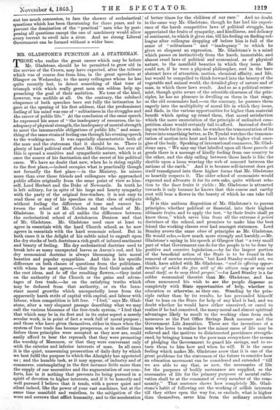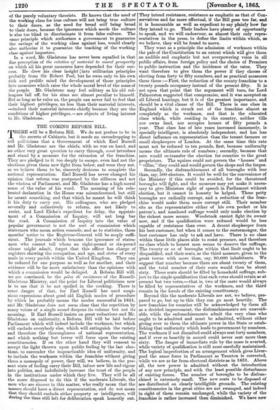- MR GLADSTONE'S FUNCTION AS A STATESMAN. T HOSE who realize the
great career which may be before Mr. Gladstone, should he be permitted to grow old in the service of the Crown, may have expected, after the tribute which was of course due from him, in the great speeches at Glasgow on Wednesday, to the many colleagues whom he has quite recently lost, to detect something of that tone of triumph with which really great men can seldom help ap- proaching the goal of their ambition. No tone of the kind, however, was audible at all. On the contrary, the subdued eloquence of both speeches bore out fully the intimation he gave at the opening of his first address, that the predominant feeling of his mind was one of " solitariness in the struggles and the career of public life." At the conclusion of the same speech he expressed his sense of " the inadequacy of resources, the in- adequacyof physical strength, the inadequacy of mental strength to meet the innumerable obligations of public life," and some- thing of the same strain of feeling ran through his evening speech to the working-men. It was especially characteristic both of the man and the statesman that it should be so. There is plenty of hard political stuff about Mr. Gladstone, but over all this is spread a sensitive and sympathetic nature, which is at ponce the source of his fascination and the secret of his political cares. We have no doubt that now, when he is rising rapidly to the first place,—indeed occupies what is practically though not formally the first place—in the Ministry, he misses more than ever those friends and colleagues who approached public affairs originally from the same point of view as him- self, Lord Herbert and the Duke of Newcastle. In truth he is left solitary, for in spite of his large and hearty sympathy with the party of the original free-traders, it is not easy to _read these or any of his speeches on that class of subjects without feeling the difference of tone and nuance be- tween the school of Mr. Cobden and the school of Mr. -Gladstone. It is not at all unlike the difference between the ecclesiastical school of Archdeacon Denison and that -of Mr. Gladstone. Mr. Gladstone used once at least to .agree in essentials with the hard Church school, as he now agrees in essentials with the hard economic school. But in both cases it is the delight of his subtle mind to engraft upon the dry stocks of both doctrines a rich graft of infused sentiment -and beauty of feeling. His dry ecclesiastical doctrine used to break into as many unexpected leaves as Aaron's rod, and his -dry economical doctrine is always blossoming into moral beauties and popular sympathies. And this is his specific 'difference on both classes of questions from the politicians, with whom he most agrees,—that they feed their minds off the root ideas, and he off the resulting flowers,—they insist on the authority of the Church or the gains and advan- tages of free trade,—he on the satisfying truths which may be deduced from that authority, or on the luxu- riant moral growths which unexpectedly issue from the apparently harsh strife of capital with capital, and labour with labour, when competition is left free. "I feel," says Mr. Glad- stone, after a very eloquent passage describing what we may -call the various blossoms of the free-trade system, " I feel that that which may be in its first and in its outer aspect a merely secular work, is in point of fact a work full of moral purpose ; and those who have given themselves, either in times when the system of free trade has become prosperous, or in earlier times .before those principles were accepted as they now are, could easily afford to bear the reproach that they were promoting the worship of Mammon, or that thex were conversant only with the exterior and inferior interests of man. In all cases it is the quiet, unassuming prosecution of daily duty by which we best fulfil the purpose to which the A lmighty has appointed us ; and the humble task, as it may appear, of industry and of commerce, contemplating in the first instance little more than the supply of our necessities and the augmentation of our com- forts, has in it nothing that prevents its being pursued in a spirit of devotion to higher interests, and if it be honestly and well pursued I believe that it tends, with a power quiet and silent indeed, like the power of your vast machines, but at the same time manifold and resistless, to the mitigation of the woes and sorrows that afflict humanity, and to the acceleration of better times for the children of our race." And no doubt in the same way Mr. Gladstone, though he has had his experi- ence of the harsh competitive laws of political struggle, has appreciated the fruits of sympathy, and kindliness, and delicacy of sentiment, to which it gives rise, till his feeling on finding col- league after colleague dropping off before him is full of the sense of " solitariness " and " inadequacy " to which he gives so eloquent an expression. Mr. Gladstone's is a mind which passes on instinctively from the harsh, immutable, and almost cruel laws of political and economical, as of physical nature, to the manifold beauties in which they issue. He could not, if he were a physical philosopher, rest in the bare abstract laws of attraction, motion, chemical affinity, and life, but would be compelled to think forward into the beauty of the vegetable and animal world, the detailed glory of nature and of man, in which these laws result. And so as a political econo- mist, though quite aware of the scientific clearness of the prin- ciples, he has no pleasure in dwelling on them in that stage, as the old economists had,—on the contrary, he pursues them eagerly into the multiplicity of moral life in which they issue, and finds, in the various opportunities for higher than material benefit which spring up round them, that moral satisfaction which the mere enunciation of the principle of unlimited com- petition alone would certainly fail to afford. Instead of dwell- ing on trade for its own sake, he watches the transmutation of its forces into something better, as Dr. Tyndal watches the transmu- tation of motion into heat and heat into the higher vital ener- gies of the body. Speaking of international commerce, Mr. Glad- stone says, "We may say that labelled upon all those parcels of goods there is a message of kindly feeling from one country to the other, and the ship sailing between those lands is like the shuttle upon a loom weaving the web of concord between the nations of the earth." And it is because self-interest does get itself transfigured into these higher forms that Mr. Gladstone so heartily respects it. The older school of economists would expound and advocate it for its own sake, quite without rela- tion to the finer fruits it yields ; Mr. Gladstone is attracted towards it only because he knows that this coarse and earthy root will bear a flower in the beauty of which he can take full delight.
It is this uniform disposition of Mr. Gladstone's to pursue principles, whether political or financial, into their highest ultimate fruits, and to apply the test, " by their fruits shall ye know them," which saves him from all the extreme a priori doctrines of the school, and promises to make him the best friend the working classes ever had amongst statesmen. Lord Stanley avows the same class of principles as Mr. Gladstone. He would echo,—how much more strongly and harshly,—Mr. Gladstone's saying in his speech at Glasgow that " a very small part of what Government can do for the people is to be done by positive and coercive legislation,—by far the largest portion of the beneficial action of the State is to be found in the removal of unwise restraints," but Lord Stanley would not, we think, have added with Mr. Gladstone, "and in ofering oppor- tunities of which the free will of the citizen may or may not avail itself, as he may think proper,"—for Lord Stanley is a far colder economical theorist than Mr. Gladstone, and has often announced his wish to see the people dispense as completely with State opportunities of help, whether in education or otherwise, as they can. Standing by the prin- ciple rather than by its results, he has persuaded himself that to lean on the State for help of any kind is bad, and we doubt whether he would have either conceived, or cared to realize if he had conceived, the many moral and almost spiritual advantages likely to result to the working class from such measures as the Post Office Savings Bank measure and the Government Life Annuities. These are the inventions of a man who loves to realize how the minor cares of life may be relieved and the motives to disinterested providence strength- ened, by bringing home to the poor man everywhere the means of pledging the Government to guard his savings, and to re- turn them to him how and when he will. It is the same feeling which makes Mr. Gladstone avow that it is one of the great problems for the statesmen of the future to consider how an education movement can be considered and extended "till we are able to say that, as now, the necessaries of life for the purposes of bodily sustenance are supplied, so the necessaries of life for the primary purposes of mental culti- vation shall be at the command of every member of the com- munity." That sentence shows how completely Mr. Glad- stone's habit of following out the working of selfish interests till they either open the way for, or exclude, what is higher than themselves, saves him from the ordinary crotchets
of the purely voluntary theorists. He knows that the need of the working class for true culture will not bring true culture to their doors, as the need for bread will bring bread to their doors, because the ignorance which needs the culture is also too blind to discriminate it from false culture. The same principle which authorises a government to guarantee the savings of the working class against loss, would clearly also authorize it to guarantee the teaching of the working class against impostors. In a word, Mr. Gladstone has never been equalled in that fine perception of the relation of material to moral prosperity on which all his great measures have depended for their suc- cess. He drew his clear insight tint° utilitarian principles probably from Sir Robert Peel, but he owes only to his own rich and prolific mind the development of those principles into measures which raise the whole moral level of the mass of the people. Mr. Gladstone may feel solitary as his old col- leagues fall off, for his aims are almost peculiar to himself. But as long as he rules us, the people can never fail to feel that their highest privileges, no less than their material interests, —indeed their material interests chiefly because they are the conditions of higher privileges,— are objects of living interest to Mr. Gladstone.































 Previous page
Previous page